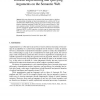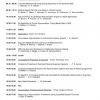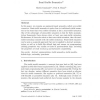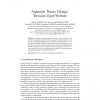COMMA
2006
14 years 1 months ago
2006
In order for one agent to meet its goals, it will often need to influence another to act on its behalf, particularly in a society in which agents have heterogenous sets of abilitie...
COMMA
2006
14 years 1 months ago
2006
In the context of Dung's theory of abstract argumentation frameworks, the comparison between different semantics is often carried out by resorting to some specific examples co...
COMMA
2006
14 years 1 months ago
2006
In the early 20th century, J.H. Wigmore described a new method for analysing and laying out arguments in legal cases. His proposal was the first system of argument diagramming, and...
COMMA
2006
14 years 1 months ago
2006
This paper demonstrates the potential of the Semantic Web as a platform for representing, navigating and processing arguments on a global scale. We use the RDF Schema (RDFS) ontolo...
COMMA
2006
14 years 1 months ago
2006
This paper offers a logical formalisation of an argument-based account of reasoning about action, taking seriously the abductive nature of this form of reasoning. The particular qu...
COMMA
2006
14 years 1 months ago
2006
COMMA
2006
14 years 1 months ago
2006
In this paper, we examine an argument-based semantics called semi-stable semantics. Semi-stable semantics is quite close to traditional stable semantics in the sense that every st...
COMMA
2006
14 years 1 months ago
2006
Abstract. This paper proposes an argument-based semantics for combined epistemic and practical reasoning, taking seriously the idea that in certain contexts epistemic reasoning is ...
COMMA
2008
14 years 1 months ago
2008
Abstract. We propose an abstract argumentation theory whose dynamics is captured by the application of belief revision concepts. The theory is deemed as abstract because both the u...
COMMA
2008
14 years 1 months ago
2008
The past ten years have shown a great variety of approaches for formal argumentation. An interesting question is to which extent these various formalisms correspond to the differen...




